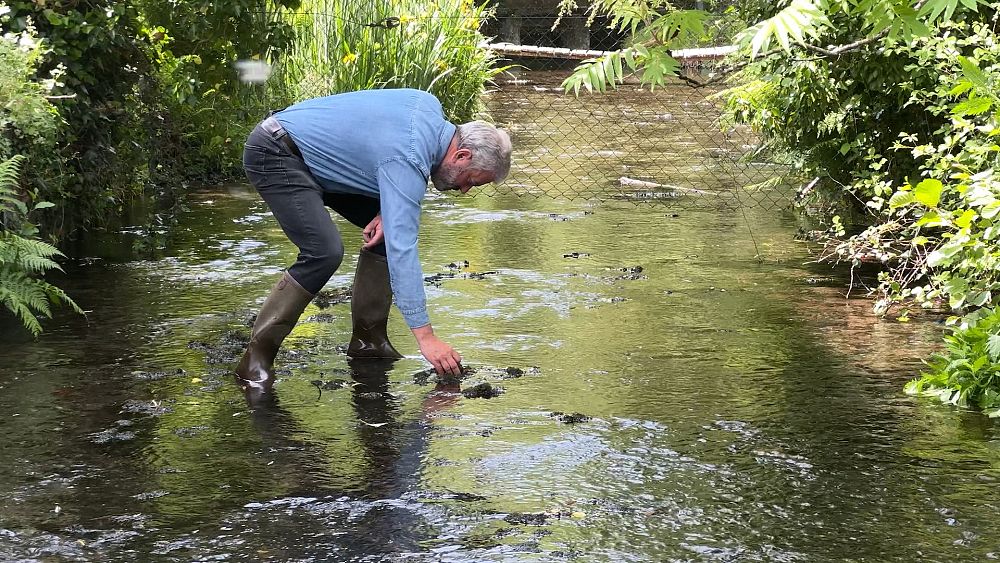Locals blame Danone group for drying up water tables in Volvic, France

A heated dispute over water is rippling through Auvergne, central France. While communities are facing water use restrictions, fingers point at multinational group Danone, accused of drying up water tables with far-reaching implications for the region’s ecosystem.
Edouard de Féligonde used to take took pride in owning the Saint-Genest l’Enfant fish farm, build by his ancesters in the 17th century in the heart of the Auvergne region in central France.
But this pride has turned sour.
“The Saint-Genest l’Enfant fish farm is the oldest one in Europe, and the only one to be classified as a historic monument. And this fish farm is now completely dried up,” sighs Edouard de Féligonde, as he takes us on a tour of the property.
The farm’s streams, once flowing and fruitful, have nearly run dry, and the fish ponds are empty, safe for the few where stagnant water is artificially kept to prevent erosion of the basins.
Accusations Against Danone
The fish farm owner. accuses Danone and its subsidiary, the bottled water firm Société des Eaux de Volvic, whose boreholes are close to his property, of drying up water tables.
“Since the Danone group took control of the Société des Eaux de Volvic in 1993, withdrawals have quadrupled.” says de Féligonde. “And that’s how we have, not a drought as many would like us to believe, but a drying up of the sources of the property.”
Edouard de Féligonde launched a legal fight against both the Danone Group and the public authorities issuing pumping permits.
Volvic’s Defense and Community Repercussions
Despite the criticism, the Société des Eaux de Volvic say their operations have no impact on the availability of drinking water. In 2020, they extracted 2.3 billion litres of water, below the 2.8 billion litres per year authorised by the state.
Their reassurances do little to soothe the growing discontent among locals, especially given recent restrictions on drinking water consumption due to declining groundwater levels.
“With the water restrictions, I’m just putting my business at risk!” exclaims craft brewer Jeff. Like for all companies using the drinking water netword in the area, he has to cut down his consumption by 25 percent. A threat to his activity he says, as he had already decidedf to reduce his water consumption by more than a third five years ago, out of concern for the environment. “When I see that Danone volumes are not controlled… Their mentality is to exhaust the soil, exhaust the people and serve clients on the other side of the world!” he rages. “So everyone should make efforts!”
Efforts which local State representatives say the Société des Eaux de Volvic has already made.
Guilhem Brun
Director, Directions Départementale du Territoire, Puy-de-Dôme
“At the end of 2021, we decreed a first structural and definitive reduction of 10% its withdrawals authorization, and planned a second reduction of 10% for 2025″, says Guilhem Brun, head of the Direction Départementale desTerritoire of the Puy-de-Dôme. “There is a structural decline of the resource. From our point of view, the reason is more to be found in other factors, in particular climate change. But it is not the Société des Eaux de Volvic which triggered the decline. »
Environmental Impact
François-Dominique de Larouzière, a geologist with environmental defense association PREVA, disputes the notion that the water level drop is due to global warming.
“The rainwater falls on volcanic ground which is extremely porous and extremely permeable. Everything will penetrate the soil. And the water will take some time to spread from the area where it falls to the Volvic outlet. Whatever the rainfall, there is no variation of the flow, since it will be smoothed out over several years.” he explains. “Every year, there is maintenance at the Volvic plant. They stop pumping for a few days” he adds. “After about forty days, we can see the flow of the resurgences go up very significantly, and without any correlation with rainfall in those periods. This really shows that these withdrawals have an influence on all the flows of the resurgences which are located far downstream” he concludes.
Hydrobiologist Christian Amblard, also a member of PREVA, notes the dire ecological consequences.
““The impact is on the whole biodiversity, particularly in terms of vegetation. And added to that, there is a whole fauna associated with the stream that no longer exists.” he says. “It is no exaggeration to say that it is the beginning of desertification of the area. We are not opposed in principle to the commercialization of water, but the priorities must not be reversed,” Amblard concludes.
Source: Euro News














